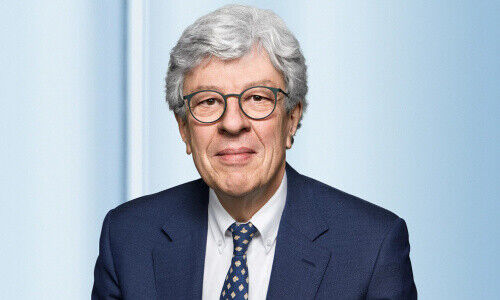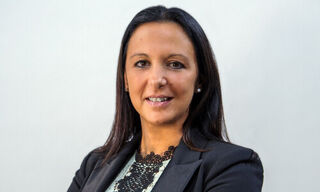Zurich's chairman doesn't like being compared to a bank as insurers need to take a far more long-term approach, he says in an interview with finews.com.
Michel Liès, Zurich is increasingly profiling itself as a sustainable group. The head office in Zurich has been reconceived to work as an extensive environmental ecosystem. That being said, what car do you drive?
A Smart.
Not an electric car?
I have to confess that I ride a motorcycle and a small car that still runs on gas.
Why?
The main problem is that we own a holiday home in France that is very far from Switzerland, about 900 kilometers away. I would love to have an electric car, but it needs to have a range of 900 kilometers as there aren't many charging stations in the middle of France. That is why I have kept my car.
Zurich is celebrating its 150th anniversary this year. Its name is not only closely linked with the city, but with the financial hub as well. Why has the financial center been such a successful one?
Today most seem to be concerned about things that are not that successful, as the example of a large Swiss bank shows.
Do you have an explanation for that?
I don't want to talk about others as a matter of course. The only thing I can say is that my counterpart there, the chairman (Axel Lehmann) was a Zurich man for many years. When it comes to representing the financial center, we are all one family. We are by no means happy when things are not going well for one of us, particularly when the country is part of the company's name.
«We still owe Alfred Escher a great deal»
More generally, I think that we as insurers have to stand back while showing how our sector adds value in the long term, particularly when it comes to managing risks, particularly long-duration ones.
This brings us back to the question of what makes Zurich such a successful financial center.
I think it is our openness to the world. We still owe Alfred Escher a great deal, even if it is a very long time ago. Zurich also has room for startups, for innovation. Banks are mostly thought of in connection with the financial center and it mostly gets forgotten that a few large insurers helped, that foreign competitors have based operations here and that the city has become a very important center for insurance worldwide.
«We are not fanatics when it comes to making uncontrolled bets»
Having a stable currency is also important. I also think we have a government that credibly leads the country. Trust in politics is still very large even if you sometimes hear otherwise. The quality of higher education also plays an important role and is something that has helped foreign insurers move here.
Don't very few people realize that?
That's right and we have to try harder to help people understand our business model. It is a resilient one, particularly in a year that hasn't been great, even if we have nothing negative to report right now. We are not fanatics when it comes to making uncontrolled bets. And I think the risk management expertise of the insurance branch needs to be emphasized, particularly at the political level.
Why?
Logically, we have to focus on immediate challenges. But as an insurer, it always bothers me that long-term aspects get the short end of the stick in many cases. The government would fare better if there was a better balance between the two although I know that is a challenge in a democratic system.
«Time is not a factor in China»
It is interesting to see how long-term issues are discussed in Beijing. The conversations are always very intense in comparison to those in the west as time is not a factor in China.
Things like shareholder value and return on equity used to be key issues. Now it seems like climate change and diversity are. Don't you think it is strange that companies have to deal with those kinds of societal issues?
I worked for Swiss Re for a long time under now-deceased chairman Ulrich Bremi who was always a role model of mine. He was also very active on the political level. I think much of Switzerland's success is due to the relationship between politicians and businessmen. I am talking about a non-elitist form of liberalism in that context.
What do you mean by that?
Liberalism has an element of elitism in many countries, which often prompts resistance in society. Here liberalism is the basis that allows us to co-exist more easily with everyone working together to become a more prosperous country.
«We should not be compared with banks»
I am also the chairman of the Avenir Suisse think tank. Our form of non-elitist liberalism is also important in that it allows us to play a role in societal issues although we do that differently now than we did during Ulrich Bremi's time.
How do insurers contribute to that concretely?
As insurers, we spell out the costs of not protecting the environment. I also think we have a large store of credibility that we should use in a more targeted fashion. The climate debate is still a very polarized one.
Are insurers more credible than banks?
We shouldn't be compared with banks. I think the case is more that we have more credibility than certain NGOs, particularly in the sense that many of them are very dogmatic and don't rely on the facts enough. Our analysis goes deeper than NGO arguments do even though – admittedly – effort and aspiration start with a strong belief.
Times are difficult. Inflation is high and recession looms...
…not here! We are lucky to have a central bank president who reacted much more quickly than others did. Switzerland also proactively managed the pandemic crisis and invested a great deal. When I represented the insurance industry in Bern, the question always came up as to how we were going to pay them back. It was always an issue. Nothing was considered as being God-given. There are no gifts from above. It is a mindset that helps our success and gives us credibility, both the county and Zurich Insurance.
Michel M. Liès has over 40 years of experience in the international insurance and reinsurance business. He began his career at Swiss Re in 1978. In February 2012 he was appointed Group CEO, a position he kept until his retirement in 2016. He has been chairman of the Zurich Insurance Group since April 2018.

































